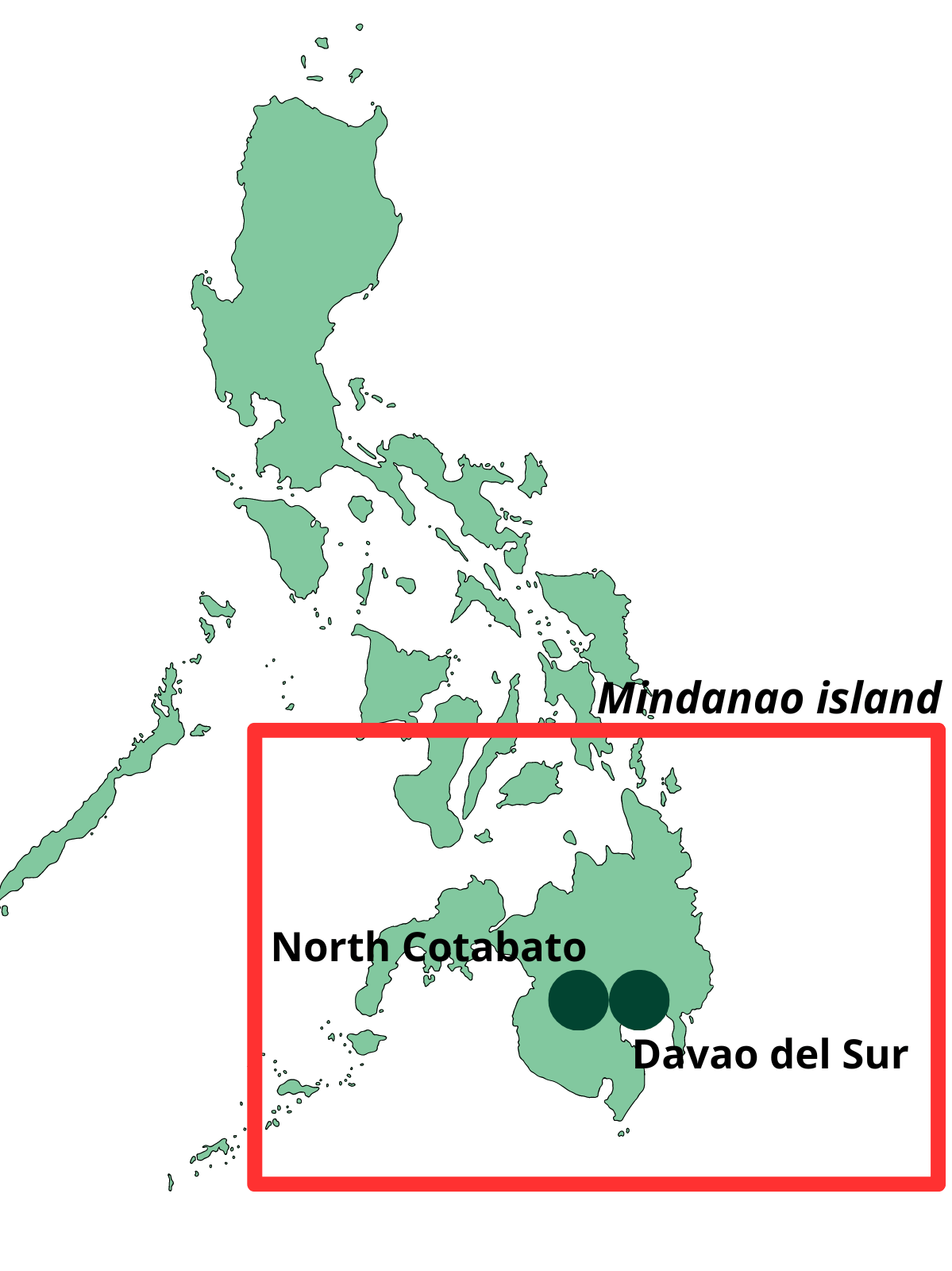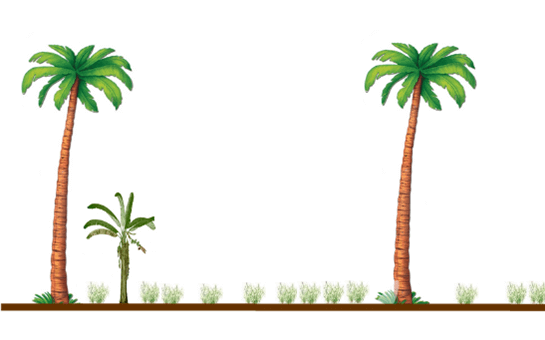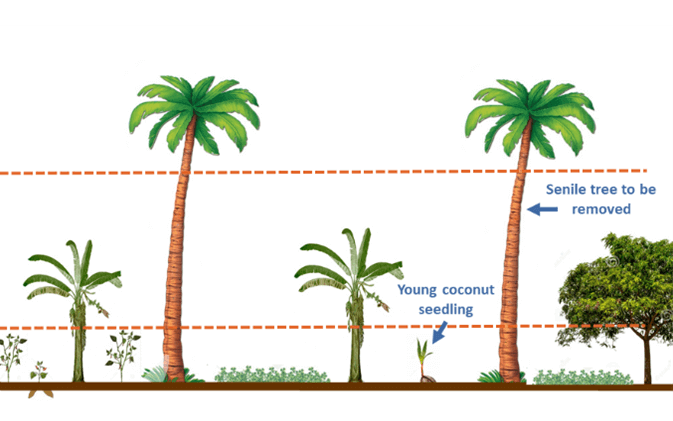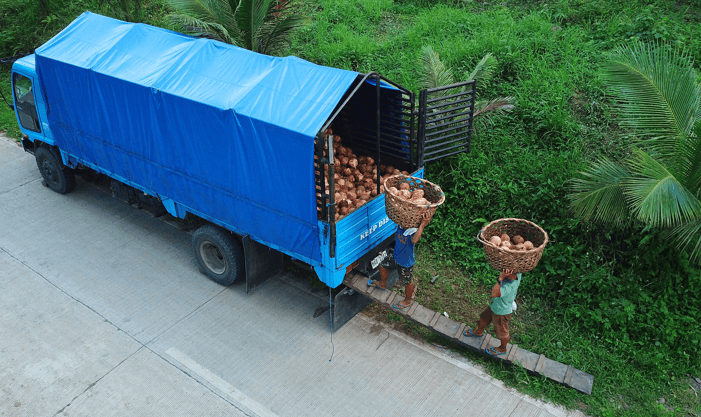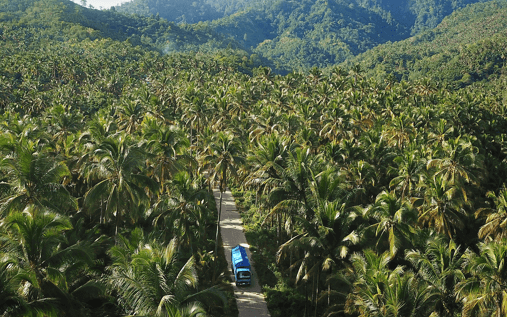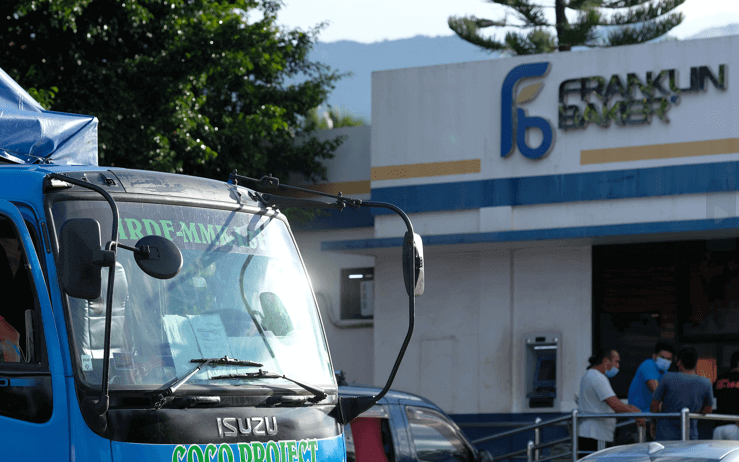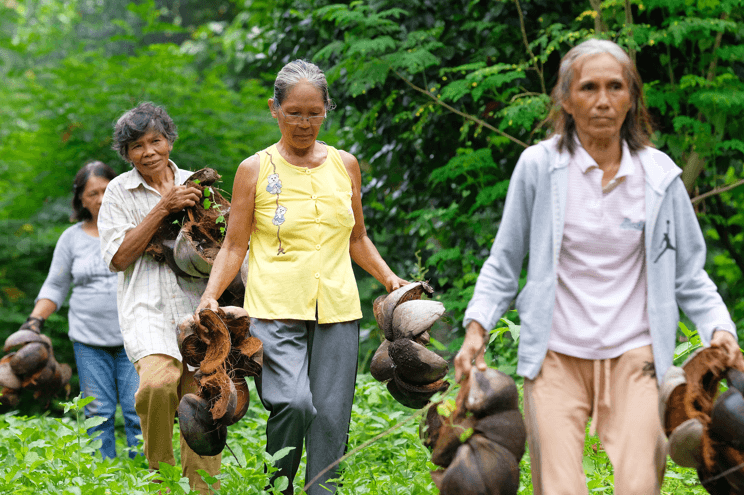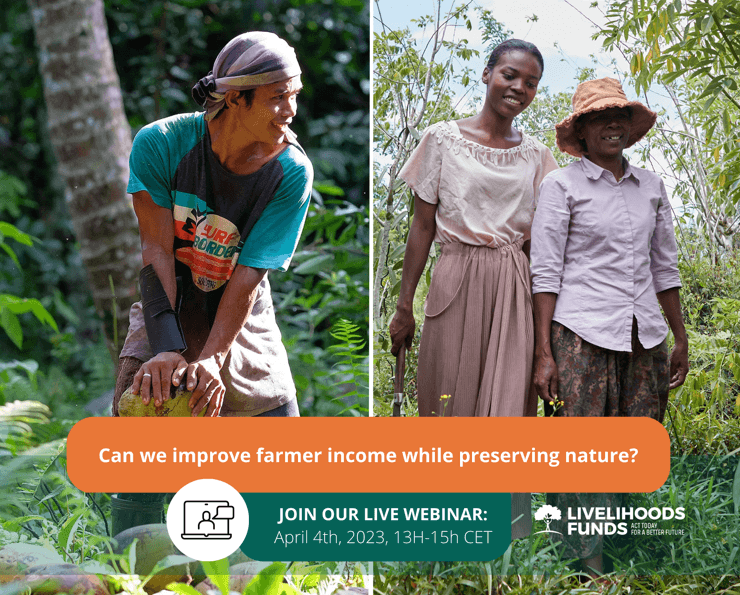In Mindanao Island, Livelihoods’ takes the bet on thriving coconut farms
Growing on the coconut palm tree in the tropics, coconut fruit is a consumer favourite. Eaten fresh or dried, it is also processed into coconut milk, while coconut oil is widely used in the food, cosmetics, soaps, and detergents industries. Coconut water is also enjoyed in many beverages. No wonder the coconut palm is known as the “tree of life”. Yet, in the Philippines, the second largest producer in the world, most smallholders are left out of this success. Back in 2018, around 50% of Filipino coconut farmers, lived with less than 2 USD a day. With the commitment of food brands Mars and Danone, Livelihoods launched an ambitious 10-year project to help farmers reach a decent living income. The project takes place in Mindanao Island with 6,000 independent smallholders and is implemented by local NGO IRDF (Integrated Rural Development Foundation).
Planting new trees in ageing plots, adopting regenerative agricultural practices to increase productivity on the whole farm (enhancing and diversifying farm production), valorising the coconut husks, creating cooperatives to access markets at better price, are the key levers activated by the project to address improved farmer income with nature preservation.
5 years later, where is the transition to resilient coconut farming at? Do smallholders earn enough to meet their families’ needs? Have they managed to increase farm productivity while preserving soil health? Here are the main levers activated by the project to improve farmer income and their main results to date.
Livelihoods’ coconut project in a nutshell
In Mindanao island, Livelihoods is implementing a new, sustainable supply chain, where coconut independent smallholders can couple quality production with better income. The project was launched by the Livelihoods Fund for Family Farming (L3F), an impact investment fund created by Danone, Mars, Firmenich and Veolia to sustainably transform their supply chains and improve the livelihoods of smallholders.
An innovative investment model to tackle farmer income and nature preservation
L3F has brought together a coalition of private and public actors to tackle some of the economic challenges deeply rooted in the Filipino coconut sector.
The fund bears the investment risk and pre-finances the project activities to structure a transparent and resilient supply chain. Danone and Mars Incorporated, both major food brands, have committed to purchase the coconut produced by the farmers at a fair price for 10 years. They achieve this through Franklin Baker, a leading manufacturer and exporter of coconut products who is the main supplier to Mars and Danone.
The activities are implemented on the ground by the Integrated Rural Development Foundation, a renowned local NGO with long-term experience supporting smallholders.
Structuring a high-quality & resilient coconut supply chain with 6,000 smallholders
The project is setting up a new supply chain which provides the farmers with the skills, infrastructure, and material to produce high quality coconut, better access the market and improve their revenues. Since 2018, the farmers involved in the project have been trained on regenerative agriculture to improve their farms’ productivity while improving soil health.
Overall, the project is implementing a direct sourcing scheme: the 6,000 smallholders will sell their crop directly to Franklin Baker through farmer-owned cooperatives. The cooperatives rely on networks of village-level farmers’ association to collect the coconut and bulk it through a unique collection point to Franklin Baker, which in turn will sell the processed coconut to Mars and Danone.
At farm level: increase land productivity & restore soil health
In the rural provinces of Davao del Sur and North Cotabato in Mindanao Island, where Livelihoods project is being implemented, 80% of coconut farmers are smallholders with less than 2 hectares of land. Decades of monocropping and intense farming (food and cash crops) had led to degraded soil fertility. The farm’s productivity was further affected by ageing coconut trees which bear less fruit: 30% of project’s area trees were over 50 years old and thus entering a declining phase.
The first lever activated by Livelihoods coconut project, was to help farmers increase their coconut farms’ productivity. For this, replanting activities were led in the necessary areas, as well as mulching activities (for which coconut farmers received specific technical skills) to help boost soil fertility and keep organic matter in the soil, especially during the dry season.
Farmer households involved in the project received specific coaching, trainings, and access to affordable labour (via farmer groups) to reinvest in their coconut farms. They were trained on regenerative agricultural practices to boost the soil’s natural fertility and therefore their farms’ productivity. 5 years after the project launch, productivity has increased by 50% in farms that have adopted mulching and regenerative agricultural practices.
Improve market connexion to increase coconut farmer income
At market level, coconut smallholders in Mindanao suffered from a scattered supply chain with many intermediaries and low farmer gate prices. With poor visibility on market’s demand and end users, farmers were highly dependent on cash advances and traders, thus discouraging them from investing in their coconut production which they perceived as a secondary source of income. Livelihoods’ project made it a priority to structure a transparent supply chain with direct sourcing from committed factories to help the farmers make the most out of their coconut farms. This required for the Livelihoods Fund for Family Farming (L3F) to structure a new supply chain involving private and public actors at every step of the value chain. L3F is financing the project activities on the one hand (farmer technical assistance on regenerative agriculture practices, replanting…), local project implementer IRDF leverages its expertise and experience working locally with coconut smallholders, while Mars and Danone, both Livelihoods’ partner investors have committed to source coconut from the project for 10 years.
Within the villages, farmer associations were first created to organise the harvest campaigns, anticipate volumes, and prepare the logistics for delivery. These units are also in charge of transporting the coconuts from the farms to specific collection points in the villages. Farmer-owned cooperatives were also structured to ensure the link between the village collection points and delivery of the volumes to a committed supplier – Franklin Baker in turn sells the processed coconut to Mars and Danone via its local factories.
A transparent price mechanism has also been defined to give more visibility to farmers and Franklin Baker and thus ensure the long-term stability of the supply chain. By selling their coconuts directly to Franklin Baker, farmers gain a better share of the product’s market value. Further commitment from Mars and Danone on supported coconut price, helped secure a more comfortable income to the project farmer beneficiaries, who are therefore protected from market price fluctuations.
Today, the project has created 15 farmer associations who deliver high quality coconuts directly to Franklin Baker and with a transparent price formula. More than 34,000 tons of coconuts have already been delivered and farmers sell at a higher price (10% more, compared to traditional local traders).
Integrating new crops and farm activities to diversify the sources of income
With coconut accounting for 20% of farmer income in the project area and being harvested every two to three months, another lever activated by Livelihoods and its partners was to diversify farmers’ sources of income. Thanks to the close coordination of local NGO IRDF who supports the farmers to better manage their whole farm, smallholders were trained to integrate crops between the coconut trees on their farm and sell them to local & international markets. Smaller trees that thrive under the shade of coconut trees were planted: bananas, cocoa, fruit trees and even ornamental flowers. At ground level: short-term food or cash crops like sweet potatoes, vegetables as both food and cash, were also integrated via specific women empowerment programs. These are being used to increase the households’ food security but also to be sold at the local village sale points for cash crop.
Today, one farm out of three, involved in the project, is now harvesting, and selling intercrops. These new crops are also contributing to increasing soil fertility and therefore the overall farm’s productivity. Some farmers have also integrated livestock and poultry in their coconut farms.
Listen to the testimony below of a coconut woman farmer who has succeeded to diversify her sources of income thanks to cocoa and banana:
On farm diversification, the project is going one step further with valorising via village units the coconut husks to create new by-products. While coconut husks were previously considered as farm waste and burned or left rotten in the plots, today, in parts of the project area, coconut husks are transformed into coconut coir, which is later used as basic material to design twines, nets, rolls or mats for horticulture and construction sites for international markets. To date, one husk valorisation training centre linked to an international operator is in place in the project area. In this activity, women and the youth from coconut villages are particularly involved, thus boosting their entrepreneurial skills.
Preserving soil and natural resources thanks to regenerative agricultural practices
All farmers involved in the project are trained to apply regenerative agricultural practices on their coconut farms to boost organic matter in the soil and avoid further nature degradation. To date, 4,500 farmers including 2,000 women have been trained on regenerative agriculture.
What is more, the smallholders are trained to apply organic compost by using animal manure and other farm residues. Overall, the mulching activities applied on the farms is helping maintain the soils organic matter. The coconut trees generate great quantities of residues (leaves and husks): the farmers have been trained to use these residues and mulch the soil around the coconut palms and thus help maintain soil humidity around the roots.
In 2022, the project reached a turning point: organic coconuts processed for Danone are now 100% sourced by certified farmers involved in the project with traced commercial flows. More 4,000 metric tons of organic coconuts have now been produced.
Join our webinar on April 4th!
Do you want to learn more about farmer income? Join our webinar on April 4th, 13H00-15H00 CET during which we will tackle the topic “Can we improve farmer income while preserving nature?”
We will share the key learnings, analyse the success factors and challenges that come along with transforming supply chains at scale. The webinar will focus on Livelihoods’ 10-year coconut project in the Philippines, and 10-year vanilla project in Madagascar. We will give the floor to our local partners who, are acting daily on the ground to support smallholders and nature resilience.



